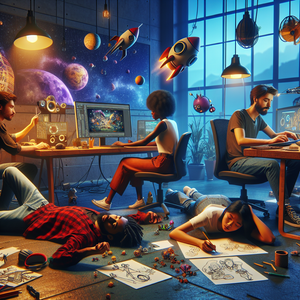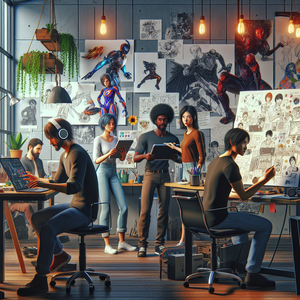
Exploring Careers in Game Design: Roles, Responsibilities, and Pathways
The world of video games is lively and constantly changing, drawing many to wonder, "How do I become a game designer?" With numerous ways to enter this field, it can feel overwhelming, but there's no single path to success. Opinions vary widely, with some experts recommending formal education in game design or computer science, while others suggest gaining practical experience through personal projects or game modifications. Equally important are soft skills like teamwork and communication, as collaboration with diverse teams is crucial. This article explores the different roles within game design, outlining tasks and requirements to help guide aspiring professionals.
Job Summaries:
Game Designer:
- Game designers are the creative minds who develop mechanics, design levels, and craft stories.
- They need creativity, technical skills in programming, and knowledge of game engines.
- A bachelor's degree in game design or a related field, along with a strong portfolio, is often preferred.
- Their main goal is to create an engaging experience for players, making sure games are enjoyable, challenging, and immersive.
Junior Game Designer:
- In this starting role, juniors support senior designers with tasks like storyboarding and testing.
- A degree in game design or relevant experience is typically needed, along with proficiency in design software.
- Juniors bring fresh ideas and help the team, paving the way for career growth.
Lead Game Designer:
- Lead designers guide a game's creative direction, working with various departments to bring the design vision to life.
- They need extensive experience, a strong portfolio, and leadership skills.
- They balance creativity with practicality, steering teams to meet project goals while maintaining quality.
Game Developer:
- Developers handle the technical side, writing code to bring design concepts to life.
- A degree in computer science or software engineering, plus knowledge of languages like C++ and Java, is usually required.
- They work closely with designers to ensure the game functions smoothly.
Game Tester:
- Testers are vital for ensuring quality, rigorously searching for bugs to ensure a smooth user experience.
- While formal education isn't always needed, attention to detail and analytical skills are crucial.
- They provide feedback to refine games before launch.
Creative Director:
- With extensive design experience, creative directors set the overall vision for a game.
- They make key decisions that shape the game's identity,
- Guiding teams through the design process.
Level Designer:
- Focusing on game environments, level designers work on layout and player interaction.
- A degree in game design or architecture is beneficial, along with expertise in design software.
- They create unique experiences within each level.
Narrative Designer:
- These designers craft storylines and character arcs, collaborating with writers and other designers.
- Strong writing skills and the ability to integrate stories into gameplay are essential.
- A background in literature or creative writing is advantageous.
UI/UX Designer:
- UI/UX designers ensure games are intuitive and accessible, needing proficiency in design software and user-focused design principles.
- They play a crucial role in making games easy to use and enhancing the player's overall experience.
Game Artist:
- Game artists create visual elements like characters and textures.
- Typically requiring a degree in art or graphic design.
- Expertise in digital tools is needed.
- They work with designers to ensure visuals match the game's style.
Sound Designer:
- Sound designers handle a game's audio, creating effects and music to enhance immersion.
- A background in music production and sound engineering is required.
- Working closely with teams to complement the game's atmosphere.
Technical Artist:
- Acting as a bridge between artists and programmers, technical artists optimize assets for game engines.
- A degree in computer science or art is beneficial, along with scripting knowledge.
- They ensure the game looks good and performs well.
Game Producer:
- Producers manage production processes, coordinating teams to meet deadlines and budgets.
- Strong organizational skills and project management experience are required to keep development on track.
QA Lead:
- Leading the quality assurance team, QA leads oversee testing processes to meet standards.
- Experience in testing and strong leadership skills are essential, ensuring polished games hit the market.
Community Manager:
- Community managers engage with the gaming community, addressing feedback and fostering positive environments.
- Strong communication skills and a passion for gaming are crucial, enhancing player satisfaction and loyalty.
Game Writer:
- Game writers develop scripts and narrative content.
- A background in creative writing or journalism is needed.
- They ensure stories align with gameplay.
- Collaboration with designers is essential.
Game Animator:
- Game animators bring characters and environments to life.
- Requiring a degree in animation and a strong portfolio.
- They contribute to visual storytelling.
- Enhancing players' emotional connections.
VR Game Developer:
- Specializing in virtual reality, VR developers create immersive experiences using VR technology.
- Expertise in VR platforms and programming skills are necessary, expanding the possibilities for interactive entertainment.
Esports Coordinator:
- Esports coordinators organize competitive events, managing logistics for smooth participant experiences.
- Strong organizational and communication skills are essential, promoting games and engaging communities.
Monetization Designer:
- These designers focus on financial aspects, developing strategies for in-game purchases.
- A background in marketing or business is beneficial, balancing profitability with player satisfaction for lasting success.
Pursuing a career in game design opens up a variety of roles, each with its own responsibilities and paths. The industry is full of opportunities, from crafting captivating experiences to managing community interactions. Including data on salary ranges, employment growth, and education versus self-taught paths could provide aspiring game designers with a more complete picture of the industry. Regular updates and citing authoritative sources would boost the article's credibility and relevance. By including personal stories, success tales, and interactive elements, budding designers can better understand and find their way into this engaging field.
Explore More Jobs

